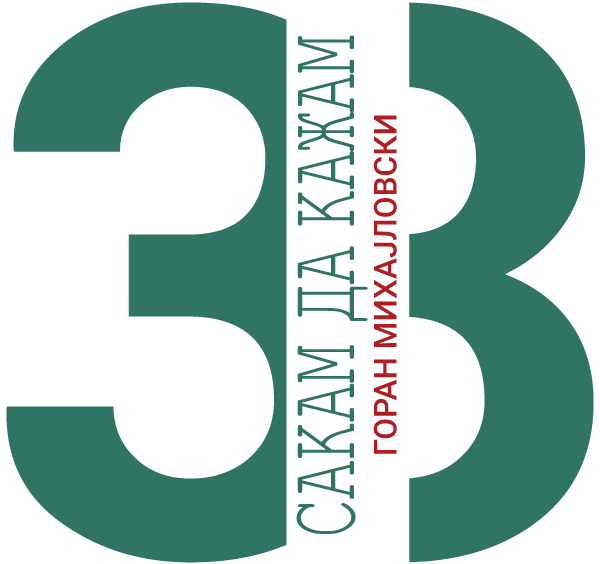1 Prime Minister Dimitar Kovachevski promised we’d have better living standards than the Czechs, Slovaks, Bulgarians, Poles, as was the case in the former Yugoslavia, who overtook us when they became members of the EU.
“I will make and lead all the necessary decisions which will provide better living standards for the citizens of North Macedonia compared to all the citizens who had worse living standards than us before,” Kovachevski said.
Oh, I can’t wait. Once we become a member of the European Union, we’ll live the way we used to in Yugoslavia. A country which was so bad that it ended up falling apart in bloodshed. Let’s put borders where there were none, and let us now erase them.
2 That being said, the only thing we need to do is include Bulgarians in the Constitution.
The President of the Commission for the preparation of the initiative to change the Constitution, Margarita Caca-Nikolovska, says that the 3,000 people who declare themselves as Bulgarians in Macedonia shouldn’t bear the consequences of some politicians from Bulgaria. “What’s the danger of including Bulgarians, Croats and Montenegrins in our Constitution?” says Caca-Nikolovska.
There’s no danger in mentioning them in the Preamble. The problem lies in the fact that including Bulgarians in our Constitution won’t lift the Bulgarian veto on us joining the EU. This is not about “some politicians from Bulgaria”. This is about the official state policy from the time of Todor Zhivkov until today.
The problem is the appropriateness of the Constitutional changes, considering the fact that the day our MPs vote on the amendments, Bulgaria will come up with a new demand and the veto will remain.
However, an even bigger problem is that the European Union doesn’t understand that. Or it simply doesn’t care. We don’t need to delve further in history to predict how our progress towards the EU will look like. Here, we can all see that Bulgaria has been treating its smaller neighbour in a hostile manner for the past three years, not as a fascist occupier, but as an EU member state. It’s not a matter of abstract threats or abstract hostility. It’s a matter of the concrete official state policy which was affirmed on several occasions in the Bulgarian Assembly promoting the message – the Macedonian people is made up, the Macedonian language doesn’t exist.
To keep us on our toes, here in the Balkans, while they’re waiting to see how the situation in Ukraine will end, the EU imposed their French proposal on us, presenting it as a solution, although it’s forced upon us. The constitutional changes will show it was not a solution at all because it doesn’t limit the opportunities for Bulgaria to continue harassing us with their historical frustrations and for the European Union to keep taking part in it by saying – there’s nothing we can do, such are our rules, they are one of us, you are not. And the EU, dancing to Bulgaria’s tune, instead of being a factor of stability, has caused us additional internal political instability.
So, that’s why, it’s not a problem to include the 3,000 Bulgarians from the census in the Preamble, along with their first and last names, if that’s a condition for us joining the EU. However, I’m afraid that we’ll live our European future from one Bulgarian veto to another.
3 Truth be told, Bulgaria is not to blame that our behaviour at home is not European. The EU bears even less blame. Why would we need to join the EU to start practicing the laws we’ve already passed and have aligned to European standards? Everything, except the Bulgarian veto, depends on us. The thing that depends on us the most is the committed fight against corruption at every level – starting from the Government, the Assembly, state companies, agencies and institutions, courts, prosecutor’s offices and inspections all the way to the municipal administrations and enterprises. Who prevents us from behaving in a European way?
According to the latest public opinion poll published by the Institute for Democracy “Societas Civilis”, when asked “Which party would you vote for”, 26 percent of respondents stated that they would not vote, while another 26 percent either said they didn’t know or refused to answer. A total of 52 percent.
The most common answers of the respondents were that all politicians work only for their personal interests – 42 percent of them have no trust in political parties at all.
That means that half of the citizens can’t stand parties. Half of the people want another bar. What’s on the menu today? SDSM, VMRO, DUI, with side dishes in the form of Levica, Alijansa, Alternativa… The same as yesterday. I don’t want it! Let’s look for another bar.
And we’re expected to vote for the people we don’t trust!? So they’d give us a society in which trust in judges and prosecutors stands at 2.7 percent. Citizens put their greatest trust of 5.1 percent in religious communities. When the judiciary and the prosecutor’s office fail to deliver justice, people think to themselves, who knows, maybe God won’t take advantage of me.
4 Still, we can take it easy. Our language stands firm, like concrete. After the leader of DUI, Ali Ahmeti, addressed the public in Macedonian on the occasion of 24 May, Saints Cyril and Methodius, Slavic Enlighteners’ Day, we can be sure that the Macedonian language has existed, continues to exist and will exist.
It’s a pity that this historic event coincided with an even more historic achievement by the Ministry of Education, which announced that there will be report cards at the end of the school year, in June. And that this “benefit” made possible by the Government can be enjoyed by students from secondary and high schools.
We’re making progress towards the EU every single day. Just like in Yugoslavia.
Translated by Nikola Gjelincheski
